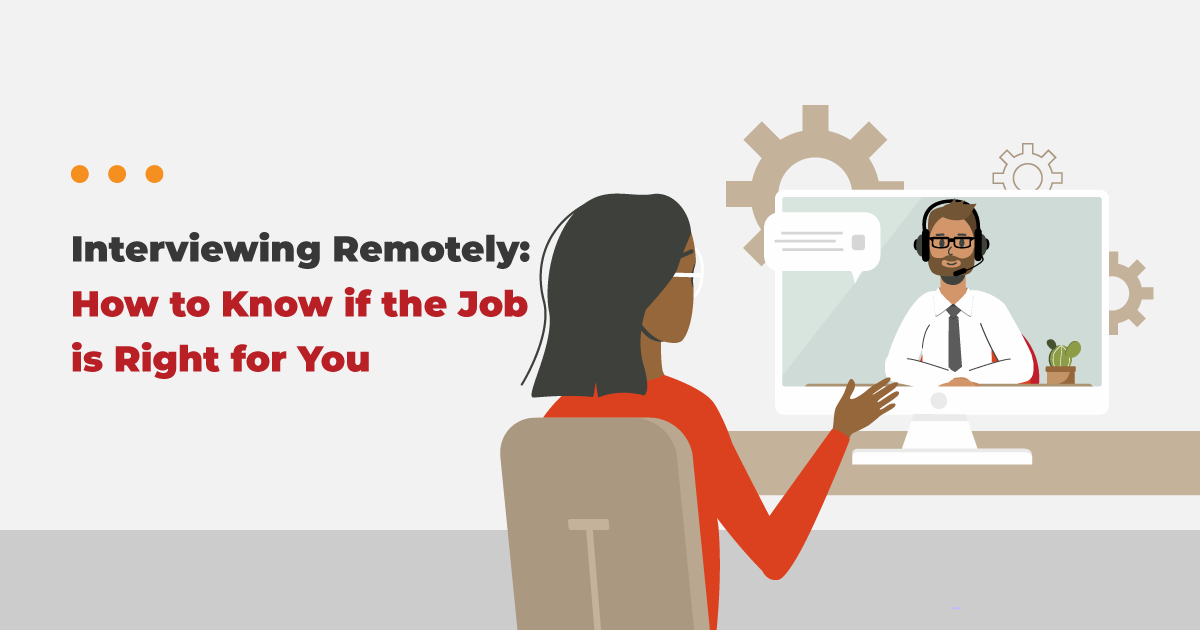Whether you’re interviewing in-person or remotely, there’s always a lot to think about when judging whether an opportunity is the right one for you. Below, we’ll cover what to think about when going through the interview process, from considering your skillset to testing the culture and more.

Table of Contents
What to consider when interviewing remotely
Many people prefer to work from home, particularly if they have children, or just like the freedom. If a job description includes remote work, that’s great news for you!
But before you jump in and apply, here are some things to consider:
1. Is it remote?
You might be a perfect fit for the job, but the fact that it’s remote might not mean what you think. Many employers advertise their jobs as “remote” even though they require you to work in an office one day per week. This could be a deal-breaker if you can’t take a day off of work to go into the office. It sounds silly, but it happens all the time!
2. Will I need my own equipment?
Many telecommuting positions will provide you with equipment like a laptop or cell phone. However, if it’s your own business and you’ll be using your own devices, make sure they’re compatible with the employer’s network and that they meet their standards (like anti-virus requirements). Equipment can be another expense for you!

3. Will I need my own office space?
Some employers will provide an office or cubicle for you, while others might expect you to work from home.
Questions to ask the company
To fully understand whether or not you should take a role, it’s vital to gain a clear understanding of the employer’s culture, values and how you’ll fit into it.
It’s good to start by doing some research on the employer’s website, to learn a little more about them and to get a feel for the culture.
The importance of a good culture
Having a positive and productive work environment is important for your career and well-being. Studies have shown that workers with engaged and happy relationships have higher levels of job performance.
Of course, everyone has different preferences when it comes to the quality of their working environment. Some people prefer a more laid-back atmosphere, while others need to feel surrounded by colleagues who are willing to offer guidance and assistance with planning tasks.

However, one thing that all organisations can agree on is the need for a supportive culture, which encourages creativity and cooperation. As a business professional, this need for collaboration and productivity is invaluable to you.
How to know if it’s a good fit
To assess whether or not it’s a good career move, here are three helpful questions to ask yourself:
- What’s the position title?
- How would you describe the position and job description if you were interviewing someone else?
- What would you expect from this role?

For instance, if you’re applying for a senior role at a small firm where you work alongside a director or the CEO, you might expect the role to have some considerable impact on the direction and profitability of the organisation, requiring you to demonstrate a significant amount of commercial experience and insight in the field, at the very least.
However, this may not be the case when applying for a more junior position at a start-up that you’ve done minimal due diligence on.
Altogether,
You have to think carefully about if this job is right for you. As tempted as you might be, don’t say yes just because they’re offering more money than you’re used to.
Instead, here are the five questions one would ask anyone who is trying to decide whether or not to accept a remote job:
- Will it enable you to reach your long-term career goals?
- Are the compensation and benefits package enticing?
- Do the job duties sound interesting and engaging?
- Can you find potential mentors and allies in the company?
- Is there potential for advancement or career development?
With these questions in mind, you will be better prepared for when a remote job is offered.
All the best in your remote interview!





